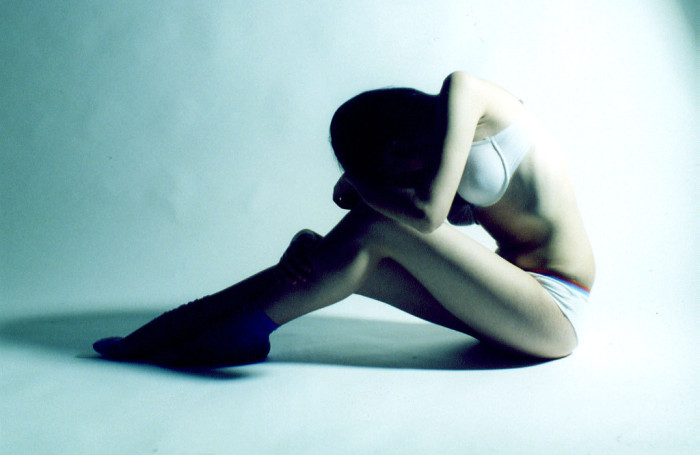 Having struggled with disordered eating myself, I know what many of the red flags look like–and I also know that eating disorders can manifest themselves in a variety of ways.
Having struggled with disordered eating myself, I know what many of the red flags look like–and I also know that eating disorders can manifest themselves in a variety of ways.
Obviously restricting food intake (anorexia) or “purging” calories through diuretic pills, vomiting, exercise, etc. (bulimia) indicate a struggle. But these two disorders are not the only ones, nor are they composed solely of the aforementioned symptoms (despite what the media usually depicts).
Eating disorders carry with them a number of symptoms–not just the stereotypical ones. They can affect someone of any age, class, race, gender… or most importantly, size!
When I first came to terms with the fact that I had a problem, I was afraid to tell people. Partially out of embarrassment and shame, but also out of fear that they would utter these horrid words: “Well, you don’t look like you have an eating disorder.” I cringe at the mere thought of someone saying this, but people do all too often.
Don’t overlook self-destructive behavior because of someone’s weight, and don’t be afraid to get help because you think that your weight doesn’t warrant you having a problem.
That being said, here are some signs that may indicate disordered eating:
1. Discomfort or anxiety in social situations where food is involved
Nervous sweats. Inability to stay “present.” Even tears at times. These were all things that I experienced in the depths of my disorder. Usually it was because there were no “safe” foods available. Sometimes it was because I would have to eat more than I wanted to. Occasionally it was because I didn’t want others to see me eat at all.
2. Refusal to eat certain foods
This is a tricky one because of the food paranoia that’s sweeping the nation right now. Corn, gluten, soy, sugar–there’s a reason to avoid nearly anything and everything. I also once had rules, now I have guidelines. There is a way that I prefer to eat which makes me feel my best. But if my options are very limited, some white pasta will suffice. (This is coming from the girl who used to think bleached flour was the devil).
Even veganism can be a cover-up for something more serious. In my journey, going vegan actually aided my recovery. However, some people choose a plant-based route solely for restriction purposes. I fully promote a diet free of animal products, but I still believe it is important to be aware that any sort of specialty diet can be a slippery slope if not approached carefully.
3. Hiding food or eating in private
Binging in the pantry. Eating alone in the bathroom. Being secretive about food choices. These are never a good sign. If you don’t feel comfortable enough reveal your food choices or eating habits to friends and family, then there’s probably something to look into.
4. Rigidity surrounding exercise
I remember a time when I would have a fit if something disrupted my exercise routine. My physical activity was calculated and precise: same time, same place, every single day. I knew how long I would work out each day and how many calories I would burn (and it was a lot).
Exercise should be fun, not a chore. That doesn’t mean I wake up every morning wanting to go to the gym, but it also doesn’t mean that my workout routine should leave me feeling depleted or get in the way of my relationships like it once did.
5. Justification or defensiveness when questioned about eating habits
People with eating disorders commonly feel the need to defend their behavior. They “just ate,” they may tell you. Or they are “sooo full already” or maybe they are “allergic” to said product. Sometimes they will meet you with hostility or an overall avoidance of the subject.
6. Preoccupation with weight or food
In the early stages of my disorder, weight, nutrition, food and exercise were all I would talk about. I quickly got wise to the fact that this made people uncomfortable and upset, but I still thought about the subjects constantly. Even when I wanted to focus on something else, my mind kept creeping back to those obsessive diet-related thoughts. As much as I hate to admit it, I think those around me were wise to how much brain-space my eating disorder took up.
7. General sense of control
Being a control-freak does not mean that you have a disorder, but most people with ED’s are- especially those with anorexia or orthorexia. I have always been a planner yet it did not reach unhealthy levels until my disorder was at it’s peak. The amount of lists I made and calendars that I filled was ridiculous. Those with eating disorders generally try to control every aspect of their life, not just food.
At certain points in my life, I even went as far as to control my emotions. Everyone around me would appear happy and I felt nothing. I could never “let loose.” I would not even allow myself to cry in front of others.
These signs are ones I have experienced myself, but there are many more. So stay aware! For me, realizing that my “healthy” obsession was actually unhealthy was a process. A part of what helped me recover is getting support; and the other was adopting a vegan diet, which helped me listen to my body’s signals–and to also be gentler to myself.
If you or someone you know is exhibiting these symptoms, please get help. Even if no disorder is prevalent, it can’t hurt to check. NEDA provides a variety of resources for those in need.
Related: Orthorexia: Stigma, Dangers and Compassion
The Importance of Forgiving Yourself
Also by Quincy: Are You Balanced in 7 Aspects of Wellness?
__
Photo: -s via Flickr
